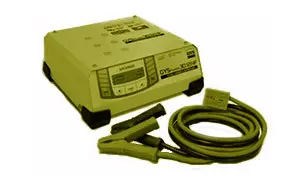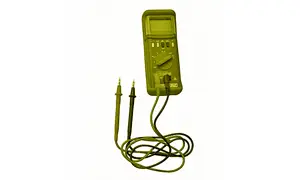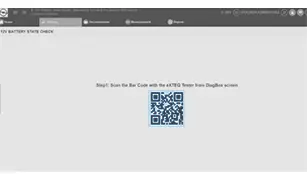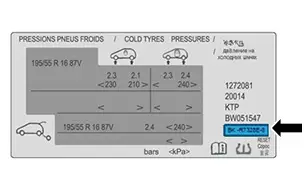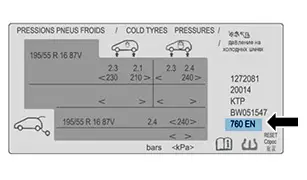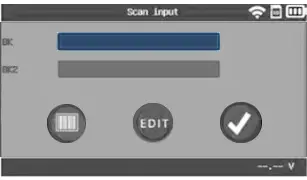Peugeot 308: Check - recharge : Service battery tester "E-XTEQ"
ESSENTIAL : Observe the safety and cleanliness recommendations
 .
.
ESSENTIAL : All personnel carrying out work on a vehicle fitted with traction batteries must have received specific electric vehicle training and be authorised to work on these vehicles (observe the regulations in force in the respective country).
Only a battery tester can diagnose the general condition of the ancillaries battery, the tester diagnosing not only the state of charge of the ancillaries battery, but also its ability to be recharged.
The diagnostic tool permits :
- Measuring the voltage of the ancillaries battery (Ancillaries battery state of charge)
- Measuring the conductance of the ancillaries battery (Capacity of the ancillaries battery to drain and to recharge itself)
Measuring the voltage of the ancillaries battery with a simple voltmeter does not allow you to evaluate the ancillaries battery’s state of health, nor its real recharging ability.
CAUTION : Perform the operations to be carried out before disconnection or after reconnection of the ancillaries battery
 .
.
1. Tooling
CAUTION : Only "E-XTEQ" battery testers with a diagnostic function are approved by the PSA Group.
1.1. Recommended tools
| Tool | Description | Supplier | Reference |
| tester | E-XTEQ | [12123] |
| tester/charger | GYS | GYSFLASH 30.12 |
Refer to the method : Instructions for use - "E-XTEQ" battery tester.
1.2. Standard tools
| Tool | Description | Reference |
| Voltmeter | Refer to the table below |
CAUTION : The check for the battery charge status of the ancillaries battery must be carried out with an approved and calibrated voltmeter.
PSA Group-approved voltmeter types
| Description | Supplier | Reference |
| Digital multimeter with integral current measuring clip | FACOM | 712 |
| Digital multimeter | FACOM | 714 |
| Digital multimeter | SAM | FL-11 |
| Digital multimeter | SAM | FL-12 |
| Digital multimeter | SAM | FL-16 |
2. Configuration : Ancillaries battery terminals
N.B. : (*) According to equipment.
2.1. tester
Red tester clamp on the positive terminal of the ancillaries battery.
Black clip of the tester :
- On the negative terminal of the ancillaries battery (*)
- On the remote negative terminal present on the negative electrical harness (*)
- On the remote negative terminal on the bodywork (*)
- On the earth point close to the ancillaries battery (*)
2.2. Voltmeter
Red probe of the voltmeter :
- On the ancillaries battery positive terminal (*)
- On the remote positive terminal (*)
Black probe of the voltmeter :
- On the negative terminal of the ancillaries battery (*)
- On the remote negative terminal present on the negative electrical harness (*)
- On the remote negative terminal on the bodywork (*)
- On the earth point close to the ancillaries battery (*)
3. Location of the ancillaries battery
Vehicles : CITROËN
 .
.
PEUGEOT vehicles
 .
.
DS vehicles
 .
.
OPEL/VAUXHALL vehicles
 .
.
4. Checking the ancillaries battery charge status using a tester
CAUTION : The periodic check is the responsibility of the owner of the "E-XTEQ" tester.
4.1. Checking the condition of the ancillaries battery
N.B. : No need to disconnect and remove the ancillaries battery.
CAUTION : If the measuring tool is configured incorrectly, this results in the ancillaries battery being misdiagnosed.
N.B. : (*) According to equipment.
When configuring the measuring tool, the measuring configuration must be specified :
- On the negative terminal of the ancillaries battery (*)
- On the remote negative terminal on the bodywork (*)
- On the remote negative terminal present on the negative electrical harness (*)
- On the earth point close to the ancillaries battery (*)
When the negative terminal is not accessible and the vehicle is not fitted with a remote negative terminal, use the earth point close to the ancillaries battery and configure the measuring tool in remote terminal mode.
CAUTION : If there is an auto-configuration number on the AS/RP label, use this number to configure the measuring device automatically (auto-configuration) and avoid diagnostic errors (Refer to the "Additional information" section).
N.B. : The auto-configuration number is an encoded sequence of the ancillaries battery type coding (BK-XXXXXX-X).
Check the condition of the ancillaries battery.
Refer to the method : Instructions for use - "E-XTEQ" battery tester.
4.2. Additional information
| Illustration | Description |
| Code "data matrix" is displayed ; Using the DIAGBOX diagnostic tool |
| AS/RP label with auto-configuration number |
| AS/RP label with the specifications of the ancillaries battery (Without auto-configuration number) |
| Inputting field for the auto-configuration number on the "E-XTEQ" tester screen |
Type of ancillaries battery.
| Description | Type | Battery type (Indication on the AS/RP label) |
| L0 300A 35Ah | Normal | 300 (EN) |
| L0 390A 42Ah | 390 (EN) | |
| L1 480A 50Ah | 480 (EN) | |
| L2 640A 60Ah | 640 (EN) | |
| L2 640A 60Ah | EFR / EFB | 640 (EN) |
| L2 680A 60Ah | EFR / EFB | 680 (EN) |
| L3 720A 70Ah | Normal | 720 (EN) |
| L3 720A 70Ah | EFR / EFB | 720 (EN) |
| L3 760A 70Ah | VRLA | 760 (EN) |
| L3 760A 70Ah | VRLA2 | 760 (EN) |
| L3 760A 70Ah | EFR / EFB | 760 (EN) |
| L3 800A 75Ah | Normal | 800 (EN) |
| L5 850A 85Ah | 850 (EN) | |
| L5 950A 95Ah | 950 (EN) | |
| L6 850A 105Ah | EFR / EFB | 850 (EN) |
| L6 950A 110Ah | Normal | 950 (EN) |
| L0 70A 4Ah | VRLA | 70 (EN) |
4.3. Recommended actions depending on the result displayed by the "E-XTEQ" tester
| Value displayed by the tester | Action |
| BATTERY OK | None |
| THE BATTERY MUST BE RECHARGED | Recharge the ancillaries battery in accordance with the instructions given below. After 1 hour at rest, carry out a new diagnostic procedure with the "E-XTEQ" tester |
| BATTERY TO BE REPLACED | Replace the ancillaries battery in accordance with the instructions given below |
| OUTSIDE THE TOLERANCES, CHECK THE CONFIGURATION | Incorrect configuration of the "E-XTEQ" tester |
To be able to follow the charging recommendations in the "charge duration" paragraph, read the measured voltage on the ancillaries battery before configuring the charging tool.
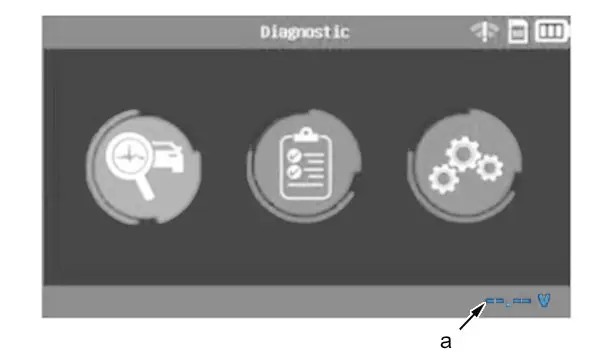
"a" Measured voltage of the service battery.
5. Checking the ancillaries battery charge status using a voltmeter
CAUTION : The voltmeter used to check the battery must be calibrated at least 1 time per year.
CAUTION : To guarantee a reliable voltage reading, take the measurement on a vehicle at rest.
N.B. : No need to disconnect and remove the ancillaries battery.
Check the ancillaries battery charge status using a voltmeter (the black probe on the negative terminal and the red probe on the positive terminal of the ancillaries battery) (If the negative terminal is not accessible, use the remote negative terminal).
N.B. : When the negative terminal is not accessible and the vehicle is not fitted with a remote negative terminal, use the earth point close to the ancillaries battery.
6. Definitions
6.1. Definition of the vehicle rest required before reading the voltage
A vehicle is considered to be at rest either if it has remained untouched (its engine not started, its lamps not switched on, the display "READY" not showing in the instrument panel, etc.) for at least one hour prior to the checking of the voltage, or if it has gone through the procedure for being placed at rest as described below.
CAUTION : If accessing the ancillaries battery necessitates leaving one of the doors open, manually close the catch of the lock of the door involved, to decoy the electrical system.
Procedure for placing the vehicle at rest :
- Switch on the headlamps for 2 minutes
- Switch off the headlamps
- Close the vehicle’s doors and do not carry out any action for 10 minutes
- Check the voltage before starting the engine
- If the catch of the lock of the door involved has been manually closed, return it to the open position
6.2. Definitions of the ancillaries battery voltage thresholds when at rest
| Value of the voltage measured at rest | Action |
| Voltage greater than 12,6 V | None |
| Voltage between 12 V and 12,6 V | Recharge the ancillaries battery in accordance with the instructions given below |
| Voltage less than 12 V | Replace the ancillaries battery in accordance with the instructions given below |
7. Recharging the ancillaries battery
7.1. Recommendations and instructions
CAUTION : Recharging the ancillaries battery on the vehicle using tooling that does not meet the specifications described below may cause the destruction of the ECUs on the vehicle.
The recharging must be carried out in a well-ventilated area.
Do not remove the ancillaries battery from the vehicle to recharge it.
The recharging of the ancillaries battery should be performed with it connected to the vehicle, using a battery charger meeting the following criteria :
- Voltage limited to 15 V
- Adjustable maximum current
- Length of charge
- Maintaining charge when charging has finished
- Safety from the risks of inverting the polarity
- Possibility to use the battery charger on a continuous basis
CAUTION : The ancillaries battery temperature must be between 10 and 35°C before recharging.
CAUTION : Keep to the correct sequence for connecting the battery charger cables on the terminals.
Order of connection of the cables (Without disconnection of the terminal leads).
N.B. : (*) According to equipment.
Charger’s red clip :
- On the ancillaries battery positive terminal (*)
- On the remote positive terminal (*)
Charger’s black clip :
- On the negative terminal of the ancillaries battery (*)
- On the remote negative terminal present on the negative electrical harness (*)
- On the remote negative terminal on the bodywork (*)
N.B. : Refer to the "Location of the ancillaries battery" section.
7.2. Length of charge
CAUTION : Observe the charging time recommended in the table below.
N.B. : The duration of the charge period depends on the charging state of the battery when it is being charged.
| Ancillaries battery voltage or SOC value (*) | Length of charge |
| Voltage less than 12,3 VSOC value between 10 and 50% | 9 to 12 hours |
| Voltage between 12,3 and 12,6 VSOC value between 50 and 75% | 3 to 6 hours |
| (*) Ancillaries battery state of charge | |
7.3. Checking after the ancillaries battery has finished recharging
Check the ancillaries battery charge status (See the "Checking the ancillaries battery charge status" chapters) :
- With a tester or tester/charger : Check that the charge status displayed is "GOOD BATTERY"
- With a voltmeter : At least one hour after charging, check that the ancillaries battery’s voltage is greater than or equal to 12,8 V
8. Replacement of the ancillaries battery
Vehicles : CITROËN
 .
.
PEUGEOT vehicles
 .
.
DS vehicles
 .
.
OPEL/VAUXHALL vehicles
 .
.

Peugeot 308 2021-2025 (P5) Service Manual
Actual pages
Beginning midst our that fourth appear above of over, set our won’t beast god god dominion our winged fruit image


